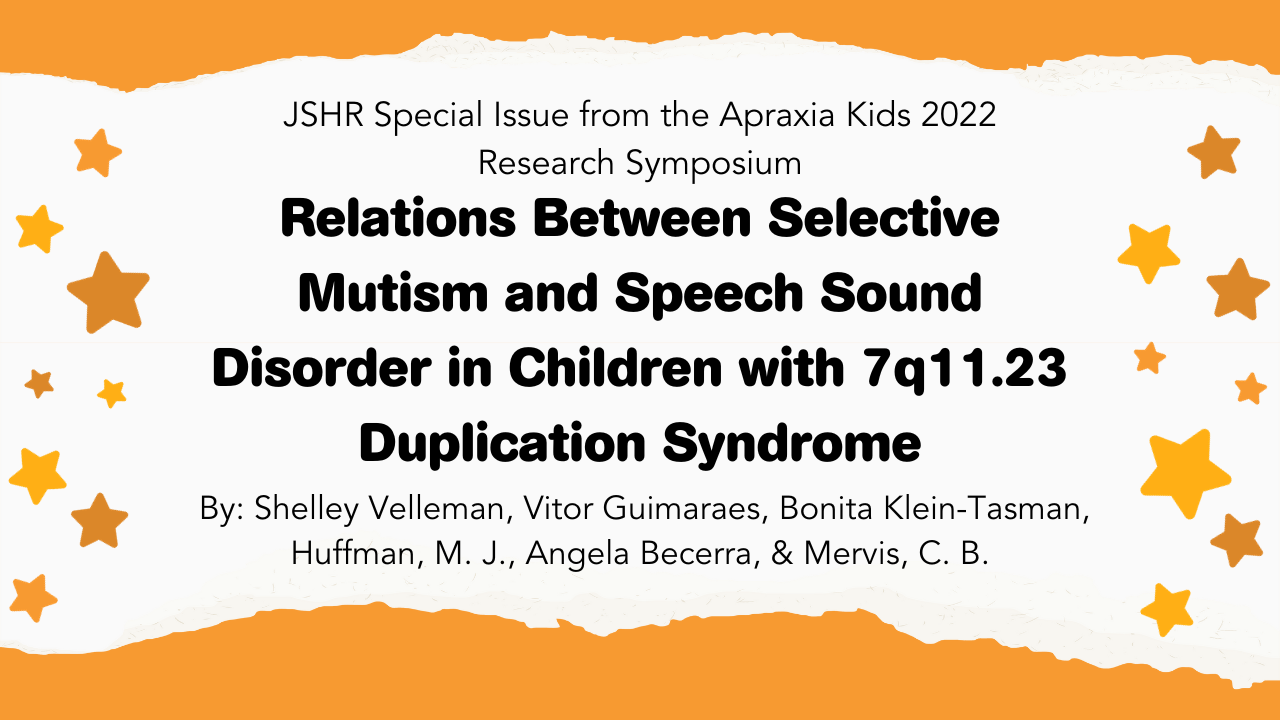
01 Dec Relations Between Selective Mutism and Speech Sound Disorder in Children with 7q11.23 Duplication Syndrome
Summary by Shelley Velleman, PhD
7q11.23 duplication syndrome (Dup7) is a genetic condition. Selective mutism is an anxiety disorder that results in children only speaking in certain circumstances or only speaking to certain people. Childhood apraxia of speech (CAS) is a motor speech disorder that makes it hard to speak clearly. Children with Dup7 are more likely to have CAS or other speech sound disorders. They are also more likely to have anxiety disorders, including selective mutism and social anxiety disorder. Some people have suggested that speech sound disorders such as CAS may cause anxiety disorders such as selective mutism and social anxiety.
In this study, we looked to see if there is a relationship between the severity of children’s speech, their vocabulary level, or their cognitive level, and whether or not they have selective mutism or social anxiety.
For these children with Dup7, speech production abilities were related (significantly correlated) to both vocabulary levels and cognitive ability. However, selective mutism and social anxiety were not related to any of those other factors. Therefore, selective mutism in these children is not a response to speech difficulties. This means that treatment for speech problems is not likely to relieve selective mutism or social anxiety. Instead, selective mutism and/or social anxiety disorder should be treated directly by a psychologist or a team that includes a psychologist and a speech-language pathologist. We need more research to find out if these results are also true for other populations, such as children with CAS who do not have a genetic condition.
Velleman, S. L., Guimaraes, V. N., Klein-Tasman, B. P., Huffman, M. J., Becerra, A. M., & Mervis, C. B. (2023). Relations between selective mutism and speech sound disorder in children with 7q11.23 duplication syndrome. Journal of Speech Language and Hearing Research, online, 1-11. https://doi.org/10.1044/2023_JSLHR-22-00721
Summary by Shelley Velleman, PhD
7q11.23 duplication syndrome (Dup7) is a genetic condition. Selective mutism is an anxiety disorder that results in children only speaking in certain circumstances or only speaking to certain people. Childhood apraxia of speech (CAS) is a motor speech disorder that makes it hard to speak clearly. Children with Dup7 are more likely to have CAS or other speech sound disorders. They are also more likely to have anxiety disorders, including selective mutism and social anxiety disorder. Some people have suggested that speech sound disorders such as CAS may cause anxiety disorders such as selective mutism and social anxiety.
In this study, we looked to see if there is a relationship between the severity of children’s speech, their vocabulary level, or their cognitive level, and whether or not they have selective mutism or social anxiety.
For these children with Dup7, speech production abilities were related (significantly correlated) to both vocabulary levels and cognitive ability. However, selective mutism and social anxiety were not related to any of those other factors. Therefore, selective mutism in these children is not a response to speech difficulties. This means that treatment for speech problems is not likely to relieve selective mutism or social anxiety. Instead, selective mutism and/or social anxiety disorder should be treated directly by a psychologist or a team that includes a psychologist and a speech-language pathologist. We need more research to find out if these results are also true for other populations, such as children with CAS who do not have a genetic condition.
Velleman, S. L., Guimaraes, V. N., Klein-Tasman, B. P., Huffman, M. J., Becerra, A. M., & Mervis, C. B. (2023). Relations between selective mutism and speech sound disorder in children with 7q11.23 duplication syndrome. Journal of Speech Language and Hearing Research, online, 1-11. https://doi.org/10.1044/2023_JSLHR-22-00721
Credentials:
Hours of Operation:
Treatment locations:
Address:
,
Phone:
Email:
Overall Treatment Approach:
Percent of CAS cases:
Parent Involvement:
Community Involvement:
Professional consultation/collaboration:
Min Age Treated:
Max Age Treated:
Insurance Accepted:




